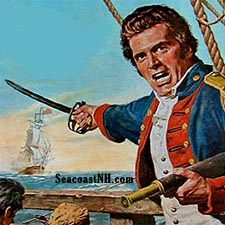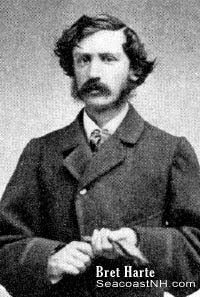|
Bret Harte Tackles Paul Jones |
|

"Off Scarborough" (1878)
POEMS ABOUT JOHN PAUL JONES
Many great writers have taken on the exploits of John Paul Jones. Many more will. Here the Cowboy Poet dramatizes the battle of the Bonhomme Richard in "Off Scarborough" by Bret Harte.
The Captain and the Cowboy Poet
Scores, perhaps hundreds, of artists have been drawn to the legend of John Paul Jones, crafting it into paintings, plays, songs, poems and stories. James Fennimore Cooper, Alexandre Dumas, Herman Melville, Sarah Orne Jewett, William Makepeace Thakery and the American novelist Winston Churchill are among the famous literary names who have taken a whack at depicting Jones. 1 And let’s not forget Bret Harte (1836-1902), the cowboy poet, whose "Luck of Roaring Camp" and other works helped pump up the literary legends of the American West. By comparison, Jones’ rip-roaring reputation in 19th century America was an apt character for Harte.
 Like many writers, Bret Harte focused on the famous battle between the BONHOMME RICHARD and HMS SERAPIS for his poem "Off Scarborough". The date of the poem’s appearance in Scribner's Monthly, (vol. 16, issue 4, August 1878) indicates it was a centennial tribute to one first and one of the bloodiest naval battles in American history.
Like many writers, Bret Harte focused on the famous battle between the BONHOMME RICHARD and HMS SERAPIS for his poem "Off Scarborough". The date of the poem’s appearance in Scribner's Monthly, (vol. 16, issue 4, August 1878) indicates it was a centennial tribute to one first and one of the bloodiest naval battles in American history.
Like Thomas Bailey Aldrich and Mark Twain , Harte was also an Eastern boy transplanted West. After working a series of jobs, Hart hit the popularity jackpot and in the mid-1800s was offered $10,000 by the Atlantic for whatever novel he might write next. He became friendly with Aldrich who once received a letter from Twain saying:
"Bret Harte trimmed and trained and schooled me patiently until he changed me from an awkward utterer of coarse grotesqueness to a writer of paragraphs and chapters that have found a certain favor in the eyes of even some of the very decentest people in the land."2
The poem "Off Scarborough" is a stirring account of the battle narrated by an unnamed crewman aboard the BONHOMME. Harte accurately tells how Capt. Landais of the American ship Alliance actually turned against his colleague Jones during the battle. Grappled together off Flamborough Head along the British coast, the two ships literally tore each other to pieces in a prolonged battle.
The ships were so close together that the narrator of this poem was able climb out on the BONHOMME yardarn and drop a lit grenade down into the hold of the SERAPIS, an historically accurate event that turned helped the tide of the battle. One of the grenades fell through an opening in the ship and did severe damage below decks. Recent research tells us that this figure was a Scot named William Hamiltin, a fact Harte would not have known. 3
By J. Dennis Robinson. All rights reserved. Originally published in 2002
SOURCES:
(1) "Cooper as Historian" by Kay S. House, San Francisco State University, 1987, State University of New York College at Oneonta
(2) Thomas Bailey Aldrich, by Ferris Greenslet, 1907
(3) Night on Fire by John Evangelist Walsh, Mc-Graw-Hill, 1978.
Photo Credit: From the "Life of Bret Harte, by Henry Childs Merwin, Houghton, Muflin, NY, 1911
OFF SCARBOROUGH September, 1779
By Bret Harte
I
"Have a care!" the bailiffs cried
From their cockleshell that lay
Off the frigate's yellow side,
Tossing on Scarborough Bay,
While the forty sail it convoyed on a bowline stretched away.
"Take your chicks beneath your wings,
And your claws and feathers spread,
Ere the hawk upon them springs,--
Ere around Flamborough Head
Swoops Paul Jones, the Yankee falcon, with his beak and talons red."
II
How we laughed! -- my mate and I, --
On the "Bon Homme Richard's" deck, --
As we saw that convoy fly
Like a snow-squall, till each fleck
Melted in the twilight shadows of the coast-line, speck by speck;
And scuffling back to shore
The Scarborough bailiffs sped,
As the "Richard" with a roar
Of her cannon round the Head,
Crossed her royal yards and signaled to her consort: "Chase ahead"
III
But the devil seize Landais
In that consort ship of France!
For the shabby, lubber way
That he worked the "Alliance"
In the offing, -- nor a broadside fired save to our mischance! --
When tumbling to the van,
With his battle-lanterns set,
Rose the burly Englishman
'Gainst our hull as black as jet, --
Rode the yellow-sided "Serapis," and all alone we met!
IV
All alone, though far at sea
Hung his consort, rounding to;
All alone, though on our lee
Fought our "Pallas," stanch and true!
For the first broadside around us both a smoky circle drew:
And, like champions in a ring,
There was cleared a little space --
Scarce a cable's length to swing --
Ere we grappled in embrace,
All the world shut out around us, and we only face to face!
V
Then awoke all hell below
From that broadside, doubly curst,
For our long eighteens in row
Leaped the first discharge and burst!
And on deck our men came pouring, fearing their own guns the worst.
And as dumb we lay, till, through
Smoke and flame and bitter cry,
Hailed the "Serapis:" "Have you
Struck your colors?" Our reply,
"We have not yet begun to fight!" went shouting to the sky!
VI
Roux of Brest, old fisher, lay
Like a herring gasping here;
Bunker of Nantucket Bay,
Blown from out the port, dropped sheer
Half a cable's length to leeward; yet we faintly raised a cheer
As with his own right hand
Our Commodore made fast
The foeman's head-gear and
The "Richard's" mizzen-mast,
And in that death-lock clinging held us there from first to last!
VII
Yet the foeman, gun on gun,
Through the "Richard" tore a road, --
With his gunners' rammers run
Through our ports at every load, --
Till clear the blue beyond us through our yawning timbers showed.
Yet with entrails torn we clung
Like the Spartan to our fox,
And on deck no coward tongue
Wailed the enemy's hard knocks,
Nor that all below us trembled like a wreck upon the rocks.
VIII
Then a thought rose in my brain, --
As through Channel mists the sun. --
From our tops a fire like rain
Drove below decks every one
Of the enemy's ship's company to hide or work a gun:
And that thought took shape as I
On the "Richard's" yard lay out,
That a man might do and die,
If the doing brought about
Freedom for his home and country, and his messmates' cheering shout!
IX
Then I crept out in the dark
Till I hung above the hatch
Of the "Serapis,"-- a mark
For her marksmen! -- with a match
And a hand-grenade, but lingered just a moment more to snatch
One last look at sea and sky!
At the lighthouse on the hill!
At the harvest-moon on high!
And our pine flag fluttering still!
Then turned and down her yawning throat I launched that devil's pill!
X
Then a blank was all between
As the flames around me spun!
Had I fired the magazine?
Was the victory lost or won?
Nor knew I till the fight was o'er but half my work was done:
For I lay among the dead
In the cockpit of our foe,
With a roar above my head, --
Till a trampling to and fro,
And a lantern showed my mate's face, and I knew what now you know!
Please visit these SeacoastNH.com ad partners.



 The Shipyard
The Shipyard




 Like many writers, Bret Harte focused on the famous battle between the BONHOMME RICHARD and HMS SERAPIS for his poem "Off Scarborough". The date of the poem’s appearance in Scribner's Monthly, (vol. 16, issue 4, August 1878) indicates it was a centennial tribute to one first and one of the bloodiest naval battles in American history.
Like many writers, Bret Harte focused on the famous battle between the BONHOMME RICHARD and HMS SERAPIS for his poem "Off Scarborough". The date of the poem’s appearance in Scribner's Monthly, (vol. 16, issue 4, August 1878) indicates it was a centennial tribute to one first and one of the bloodiest naval battles in American history.














